
Part two of a week journey through Senegal
Saturday morning, Karim, Albert and I hit the road in the car my boss affectionately calls « Le presidentiel ». The sun beats heavily down on us, the skies are at their bluest, large expanses gleam gold in every direction.
-

-
As we head towards the small villages of the interior, the road quickly degrades. Le presidentiel, must at points veer completely off of it to avoid massive potholes… it must also, at many reprises, halt completely to let pass herds of august, staunchly composed cattle. We have entered Peul country. The Peuls, an ethnicity that has long dominated this region, pride themselves on being the care-takers of these large, regal beasts.
-
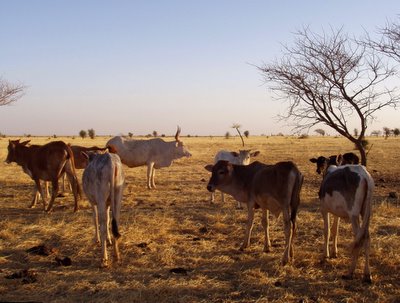
-
I first heard about the Peuls over dinner with a Senegalese friend. He commented, laughing, that the beef I was eating was probably stolen. Stolen? Yes, not much beef on the market in Senegal… the Peuls own all the cattle and they refuse to sell them. For the Peuls, it is about prestige, how many heads you have. Large quantities of inaccessible cows coupled with a great demand for beef has resulted in an extensive network of cowsnatchers. Prestige? Yes, the Peuls have a very special relationship with their cows... a long tradition of sharing the land, of raising and of accumulating. If a Peul lets go of one of his cows, it isn't for money but given as a gift. Cattle are still offered as part of the dowry to the parents of the bride-to-be.
The second thing I heard about Peuls, from a young man in St. Louis, is that they are all xenophobes. Why?, I ask my interlocuteur. "Because, they refuse to learn Wolof!" Frustrated, he explains, “ they just don’t want to let go of their language, even though everyone now uses Wolof to communicate! They won't even acknowledge someone speaking to them in Wolof, even if they understand.”
Fact check: Wolof, over the last 40 years, quickly spread through Senegal as religious leaders and merchants traveled inwards from larger cities. However, Pulaar is still spoken by over 2 million of the country’s inhabitants and by 16 million + in West Africa.
Before leaving for Matam, I learned at the volunteer committee meeting, during our after-lunch siesta, that Albert is Peul. I had been watching him for a moment, lying on the mat, fingers interlaced on his chest, a serene, even joyful, regard on his face. I ask, “Albert, do you dream?” Though usually quite reserved, he answers promptly, “yes, I’ve had very vivid dreams lately, especially right before I wake. I dream I am surrounded by my animals. A big circle of them… I am in the middle. And I talk to them”. Maybe I had interrupted him right as he was pleasantly recalling his morning’s vision.
Albert is from the Matam region. His grandmother recently passed away. Part of reason he was going with us to Matam was so to pay his respects to his (very large) family. “If there is a little extra time”, he says, “I’d like to visit my animals”. "Do you have a lot of them?" "Oh yes… we have at least 200 cattle, as well as moutons and goats”. Albert explained that in his family, young boys train with the shepherd starting at the age of 6. Up until the age of 12 they are given lessons on how to care for the flocks and herds, how to milk the cows, how to teach the little ones to stay with the group. There is even a system of calls to which the different animals respond. “We learn respect for our animals.” I asked Albert about the Peuls hording all the cattle… "is it really just about prestige?" "Yes, it is mostly about prestige, but also a deeply engrained affection". They can not bare commoditization of an animal they view almost as sacred. Albert describes his family as particularly traditonal in this sense. And though he says they are also devote Muslims, I found his discourse more like that of a Buddhist.
On the road, we crossed paths with Sylla, the coordinator of an NGO in Matam. With so few cars on the rural road, he was easy to spot. Sylla and I had met at the case soon after my arrival. He gave me my first lessons in Senegalese culture.
 _
_
As we rolled along, the three of us talked a great deal about cultural differences between Americans, the French and Sub-Saharan Africans. They had lots of questions about the U.S. Are there few poor people? What percent of the youth are aware of global events? What kind of people support Bush and WHY? Is everyone really overweight? Someone told me if you don’t have money in the States you are nobody, is that true? Do you really think the US is ready for a woman president? This last question, spurred many others. I was also very interested in the topic, since in Africa the women are by and large still fixed in traditional roles. So, what do these two men, involved in the collective progress of their people, think about it? Karim was adamant that big changes needed to be made… and that things can evolve rapidly if action is taken, using Western nations as an example. Albert, on the contrary, thought the change would have to come slowly. People just aren’t ready yet. It was a lively debate. My feeling is that if women themselves are content with their current position, convincing them they should adhere to a different system will be quite difficult. Are women happy with their status, their role in society? I don't know. But, I imagine many women do not give it much thought, since they are too busy just surviving. The one thing we all clearly agreed upon is that girls should have the same access to education as boys. That’ll help move things along.
Ouro Sugi
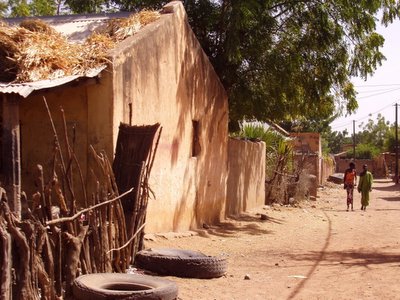
Arriving in Matam, we first stopped off in the small town of Ouro Sogui for lunch at Albert’s family home. As soon as I stepped out of the car, children ran towards us, squealing with glee, TOUBAB, TOUBAB!!! I asked Albert why do they always do the Toubab chant? And how is it that every child, even as young as 2 years old, knows the term? He laughs… “I don’t know how, does it bother you?”. It doesn’t bother me on a personal level but I just don’t understand how or why they are taught this distinction. Albert tells me that I certainly shouldn’t take offense. It is their way of making you feel weclome, it’s like a term of endearment. He goes on to say that way back when, toubab (which literally means foreigner) was the name for a doctor who came and helped people. Good thing I asked because for the next 3 days I was singled out, pointed at, danced around by children of all ages singing “toubab, toubab, toubab!” everywhere we went. And I did stop minding, since they were so full of smiles, and unlike in Dakar, they weren’t asking me for money.
Albert, shows a local effort in his home town of planting banana fields.
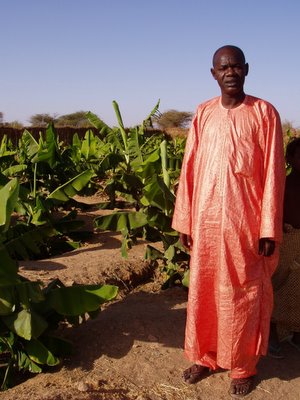
Luckily, we managed to get most of the official business taken care the first day, leaving Sunday open for downtime. Albert invited us to spend the afternoon with him at his grandmother’s house… then later, we could go out in the “ brousse” to visit his animals. Karim and I, knowing it was a delicate time with the recent passing, thought it better to decline. But, he insisted.
That night, Albert stayed with his family. Karim and I lodged at Sylla's home. When night fell, my breath was taken away by the millions of twinkling stars in the sky. Very few times in my life have had I been in a place with close to no artificial light. I could have stayed up all night, gazing up at the heavens… shooting stars flashing by every few minutes.
Having lunch at Albert’s grandmother’s home on Sunday helpd me better understand his reasoning in the prior day's conversation. After the usual extensive greeting process, we took our seats on a mat with a few of his uncles and brothers. Not long after, the women and children across the courtyard were huddled on their own mat around a communal platter. I said jokingly to Albert “shouldn’t I be eating with them?”. Looking relieved, he exclaims, “oh, you want to eat with them, no problem! Come, come, I’ll introduce you”. Woah, wasn’t expecting that. But, one need not be very perceptive to understand that Albert was uneasy about this Western woman guest colliding with his home world of "traditional" values… so I was happy to bring him peace and to just go with the flow. The children and women smiled and giggled, expertly palming the rice into little balls, making it in their mouths with out a drop. I, refusing the spoon they had offered me, clumsily tried to do the same. More giggles and laughter. It didn't take long before one of the women sent a child to get me a cloth to cover my clothes.
I stayed with the ladies the whole of the afternoon. Within 10 minutes, they wanted to marry me off to a Senegalese man and were ready to send me home to the US with one of the youngest children. The little guy, already a little frightened by my pale appearance, would let out little screams when maman would say “don’t you want to go with her to les Etats Unis!”.
Notice the posture of the young girl cleaning the big bowl. Legs completely straight, back forming a graceful S curve.

But that was about the extent of our communication. No one spoke more than a few words of french, and Albert had warned me sternly to keep my Wolof under lock and key. No matter, I was happy just to sit and observe. 3 families live in this large home, each couple with about 8 children. My goodness, 24 kids plus visiting cousins and friends made for a full house! 7 men sat together, appearing to be in deep reflection, speaking one at a time, long pauses in between.
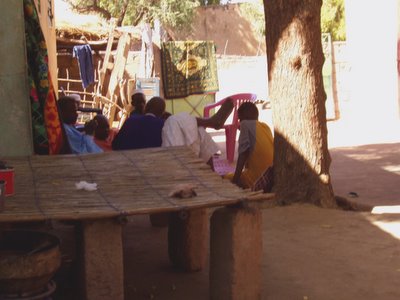
The younger boys sat a little ways from the men, preparing the 3 service tea. The women and girls stayed busy with domestic chores, the kids ran around and played. And even though all the activity made for a super boisterous afternoon, there was an underlying calm, a sort of harmonization. Everything executed in perfect orchestration, with out the need of a conductor.
The Diallo family... kids everywhere!

Around 5pm we said our multitude of goodbyes, and made our way out to small patch on a huge piece of land where the shepherd and his family lives.
Getting there wasn't easy... but thanks to heavy procreation, we had loads of little guys to help us out of sand spots!

As we headed further in to the wilderness, It was like being whisked off in a time machine to a world of long past. As the sun was setting, the animals trotted back towards their night refuge. We watched the procession in silence. I was moved by the beauty, by the simplicity and by seeing Albert so content.
ALBERT'S TROUPEAU

Senegalese Cows... majestic.

--
Talking with Albert and the Shepherd

_
No running water, no electricity. Food is cooked in large cauldrons over wood gathered from the fields.

The Shepherd
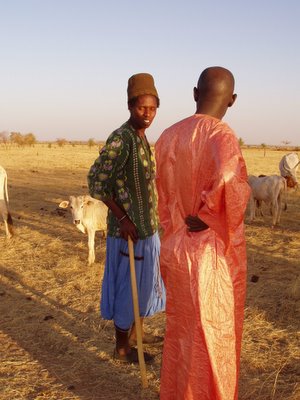 _
_
-

So there you have it, a glimpse in to the world of the Peuls… to a village of Africa still doted with the traditional practices of long ago. A life-style founded upon rites, rituals and roles, of balance and harmony… a life-style on the verge of extinction.
Bye bye Matam... 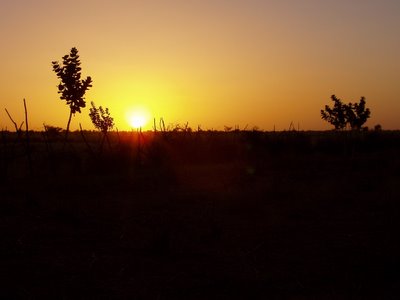
9 comments:
It is nice to see the toubab that you are actually in one picture. This blog entry really makes me feel like I know the people of Matam. Photos sure help understand your surroundings otherwise it's hard to imagine. Keep up the blog. It's wonderful!
How extra-ordinary, Lili. I'm am very impressed. I think this is your best log, ever. The photos are amazing. The striking difference between you and the men makes it very easy understanding why the children run around calling you "toubab". I've been reading your book "Things Fall Apart" by Chinua Achebe--a I feel like I can understand the photos a bit better now. Wow. I am so jealous and very proud of you little sister.
Ps. Do you know where the Ibo live?
Is the toubab growing a horn? According to the picture a horn is growing on the side of your head?
The women you were with one afternoon, wanted to marry you right away. They were honoring you for sure. How did you respectfully decline their suggestions without speaking their language?
Sarah, I'm so happy you discovered Achebe... don't lose my book! He has an eloquent and powerful writing style and will help you understand polemics still current in today's discussions on identity and collective progress of African peoples.
And to the women I answered, "I am engaged" and "oh no, the little one is way too happy here".
Lili,
I'm glad I read the book too. It actually helped me out alot with my novel, it answered an agricultural farming question and gave me an inspiration of how the Timucua may have spoken to eachother. I brought it home with me to Chicago and read it on the train. I nearly "accidently" forgot to bring it back to Michigan. :)
Love Sairy
Ps. What on earth does polimics mean, and what specifically are the identity and collective progress discussions you are refering to? Is it the religion, the invasion of the Europeans?
The Nobel prize-winning Carribbean poet Derek Walcott declares that history in the Third World has thus far produced only a "literature of recrimination and revenge written by the descendants of slaves or a literature of remorse written by the descendants of masters" (Walcott, p.371), and this claim is certainly substantiated in the above-cited writings (listed in www.thecore.nus.edu.sg). These authors have shown us only the negative consequences of colonialism. Is it possible that there is another path leading from the crossroads of which Achebe speaks? A means of negotiating the conflicting cultures to achieve a solid and positive sense of identity?
Achebe's seems to be a vision of optimism sharply contrasting the examples in literature. But we understand his ideas more clearly when viewed in the context of his own quest for identity. He credits his first book as being the primary step in his peace-making process. "Although I did not set about it in that solemn way I now know that my first book, Things Fall Apart, was an act of atonement with my past, the ritual return and homage of a prodigal son." (Achebe, p.193) Achebe has used his education as a means by which to strengthen, not demean, his cultural heritage; a means to forge a new identity of his own.
There are many others who share this optimistic view and maintain that it is indeed possible to find a positive sense of identity in a post-colonial state. Further, literature of post-colonial nations, while being a means for personal inquiry as was the case for Chinua Achebe and his first book, can function as a forum that fosters an exchange of ideas and encourages that same personal inquiry on the part of the reader. Instead of offering portraits of loss and grievance, authors might utilize their talents to re-invent identity, thus offering a new perspective to readers looking to literature for inspiration or guidance.
Polémique (n.): Discussion, débat violent sur un sujet politique, scientifique, littéraire.
Polemic (n.) 1. A controversial argument, especially one refuting or attacking a specific opinion or doctrine.
2. A person engaged in or inclined to controversy, argument, or refutation.
Is it "polimics" or "polemics"?
MatanteSuebab
MY NAME IS MARIAM FROM SOUTH AFRICA...I SAW THIS COMMENT ON POSITIVE BLOGS AND I WILL LOVE TO TELL EVERYBODY HOW MY STATUS CHANGES TO NEGATIVE, AND AM NOW A LIVING WITNESS OF IT AND I THINK ITS A SHAME ON ME IF I DON'T SHARE THIS LOVELY STORY WITH OTHER PEOPLE INFECTED WITH THIS DEADLY VIRUS...,HIV HAS BEEN ONGOING IN MY FAMILY... I LOST BOTH PARENTS TO HIV,. AND IT IS SO MUCH PAIN IVE NOT BEEN ABLE TO GET OVER.. AS WE ALL KNOW MEDICALLY THERE IS NO SOLUTION TO IT..AND MEDICATION IS VERY EXPENSIVE..SO SOMEONE INTRODUCED ME TO A NATIVE MEDICAL PRACTITIONER IN AFRICA..I HAD A JOB THERE TO EXECUTE SO I TOOK TIME TO CHECK OUT ON HIM.I SHOWED HIM ALL MY TESTS AND RESULTS.. I WAS ALREADY DIAGNOSED WITH HIV AND IT WAS ALREADY TAKING ITS TOWL ON ME.. I HAD SPENT THOUSANDS OF DOLLARS SO I DECIDED TO TRY HIM OUT...I WAS ON HIS DOSAGE FOR 1 MONTHS. ALTHOUGH I DIDNT BELIEVE IN IT, I WAS JUST TRYING IT OUT OF FRUSTRATION... AND AFTER 2 WEEKS, I WENT FOR NEW TESTS... AND YOU WONT BELIEVE THAT 5 DIFFERENT DOCTORS CONFIRMED IT THAT AM NEGATIVE..IT WAS LIKE A DREAM,,I NEVER BELIEVE AIDS HAS CURE..AM NOW NEGATIVE,,AM A LIVING WITNESS..I DONT KNOW HOW TO THANK THIS MAN... I JUST WANT TO HELP OTHERS IN ANY WAY I CAN..HAVE JOINED MANY FORUMS AND HAVE POSTED THIS TESTIMONIES AND ALOT OF PEOPLE HAS MAIL AND CALLED THIS MAN ON PHONE AND AFTER 2 WEEKS THEY ALL CONFIRMED NEGATIVE..BBC NEWS TOOK IT LIVE AND EVERY.. HOPE HE HELPS YOU OUT.. EVERYBODY SAW IT AND ITS NOW OUT IN PAPERS AND MAGAZINES THAT THERE'S NATIVE CURE FOR HIV AND ALL WITH THE HELP OF THIS MAN,,HAVE TRIED MY OWN PARTS AND ALL LEFT WITH YOU,,IF YOU LIKE TAKE IT OR NOT..GOD KNOWS HAVE TRIED MY BEST.ABOUT 97 PEOPLE HAVE BEEN CONFIRMED NEGATIVE THROUGH ME..AND THEY SEND MAILS TO THANKS ME AFTER THEY HAVE BEEN CONFIRMED NEGATIVE,,THIS MAN IS REAL..DON'T MISS THIS CHANCE,,HIV IS A DEADLY VIRUS,,GET RID OF IT NOW..
case there is anyone who has similar problem and still
looking for a way out, and he those cast all kind of spell like ::
Love Spells
Luck, Money Spells
Health, Well Being
Protection, Healing
Curses, ex, Breakups
NEW! Combo Spells
High Priestess Spells
Vampire Spells
Authentic Voodoo Spells
Custom, Other Spells
Business spells
Health/Healing spells
Cancer healing
Curse removal
Job spells
Healing from all kind of diseases
Love binding
Barrenness(need a child)
Need love
Lottery Spells
Promotions
Success
Money rituals
winning court case
Divorce spells
Low sperm count
Infertility in women
Breast enlargement/reduction
Penis enlargement/reduction
YOU CAN CONTACT HIM HERE AS (dr.abalaka@outlook.com) and also his state based number text him here if you're in the US: 760-935-3804 if you need any question contact me via here as mariambaurice@gmail.com i wish you best of luck and good health.
Post a Comment